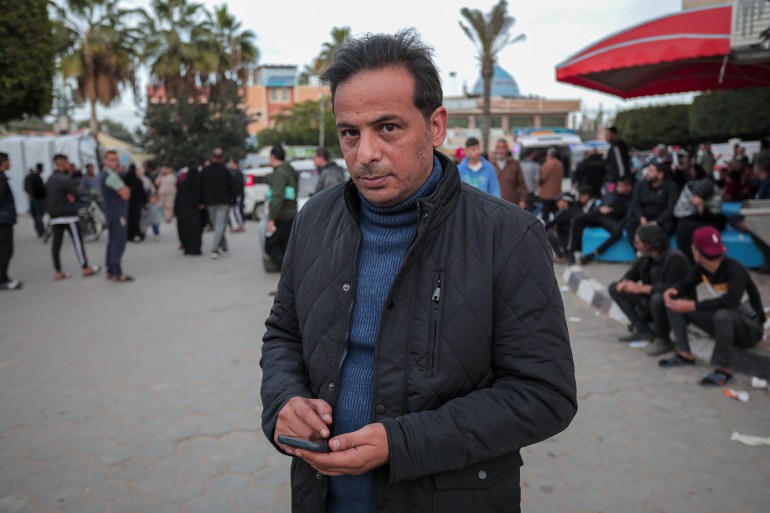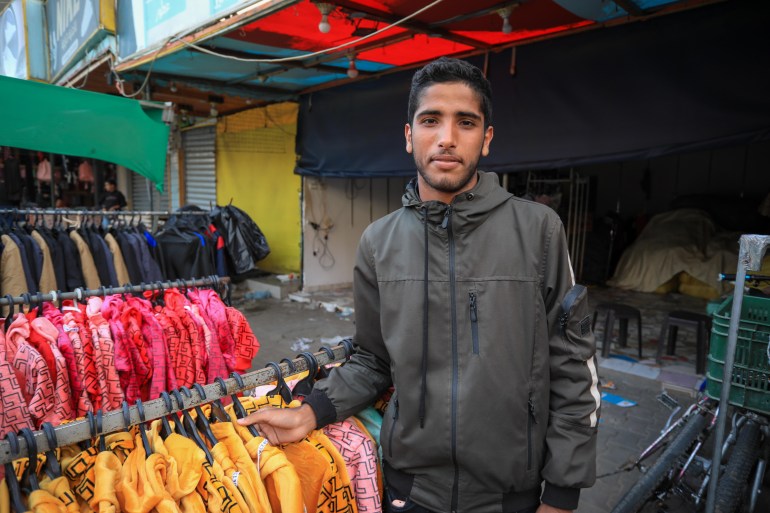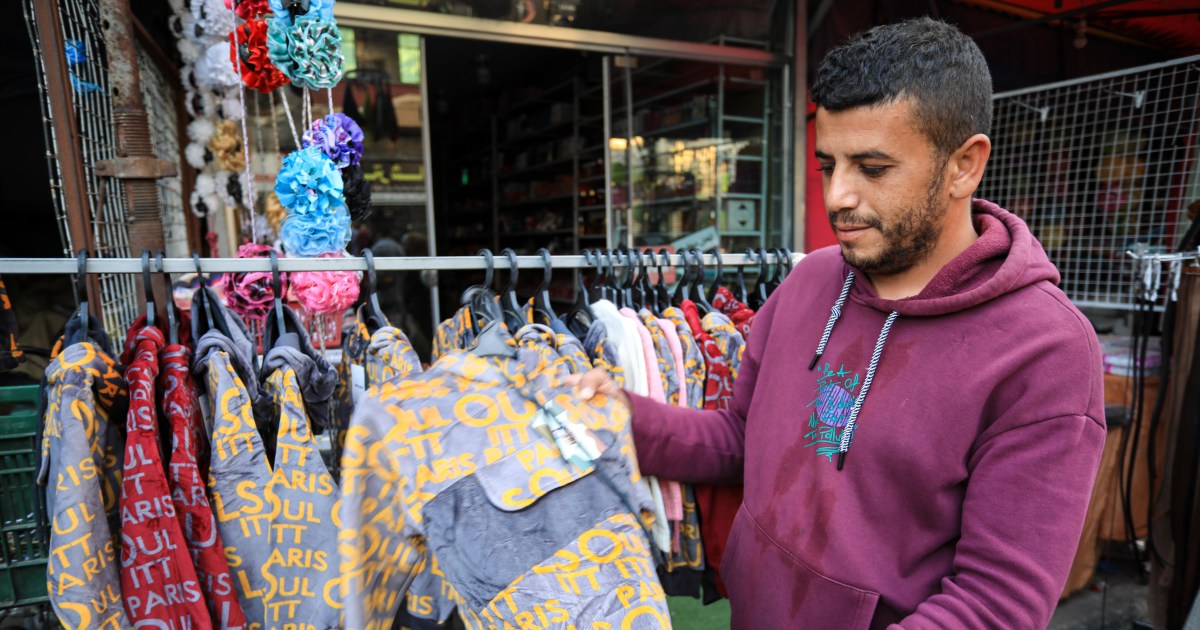Deir el-Balah, central Gaza Strip – Because the sounds of struggle quietened with the appearance of the primary truce between Israel and Hamas since October 7, the markets within the Gaza Strip have been flooded with customers, determined to purchase meals provides and winter garments.
However the price of these merchandise has skyrocketed, notably for primary foodstuffs, sparking anger and resentment amongst customers who blame shopkeepers and stallholders for prime costs.
Imm Abdullah, who was displaced from her house within the Nassr neighbourhood in Gaza Metropolis a month in the past after Israel ordered folks in northern Gaza to maneuver south, has been staying at one of many United Nations-run faculties in Deir el-Balah along with her 12 youngsters and grandchildren. She mentioned circumstances within the college have grow to be determined, with no water and barely any provisions.
“When the Israelis threw leaflets down at us, I left with my household carrying simply my prayer garments,” she mentioned. “On the college, we barely get meals help. The opposite day we bought a can of tuna. How am I purported to maintain my household with that?”

Imm Abdullah had come to the city’s market to attempt to purchase meals and a few hotter garments for herself and her grandchildren, because the climate had turned chilly. However after visiting totally different stalls to search for primary meals merchandise, her exasperation bubbled over.
“I don’t imagine the retailers once they say the costs are out of their management,” she mentioned. “They will regulate costs and be thoughtful of the truth that we’re going by distinctive occasions, which isn’t one thing they need to reap the benefits of.”
She rattled off an inventory of merchandise that at the moment are unaffordable: Bottled water, which was 2 shekels ($0.50), is now 4 or 5 shekels ($0.80-$1). A carton of eggs is 45 shekels ($12). A kilo of salt, which was 1 shekel is now 12 ($3.20), whereas sugar is 25 shekels ($6.70).
“It’s so unfair,” Imm Abdullah mentioned. “I can’t take it any extra and a few days I am going sit by the ocean and weep as a result of I don’t know learn how to feed or maintain my household. Generally I want we had stayed in our house and bought bombed as a substitute of going by this.”
Billions misplaced because of blockade
In line with the Palestinian Central Bureau of Statistics, the poverty fee within the Gaza Strip has reached 53 %, with one-third (33.7 %) of Gaza residents residing in excessive poverty.
Roughly 64 % of households in Gaza are with out sufficient meals, and unemployment is at 47 % – one of many highest charges on the earth.
In line with Elhasan Bakr, an financial analyst based mostly in Gaza, the worth distortion has led to inflation of between 300 and a couple of,000 % for varied merchandise.
Even earlier than October 7, a 17-year Israeli blockade on the coastal enclave had resulted within the lack of $35bn to the Palestinian financial system.
“The most recent Israeli aggression has been one other nail within the coffin of Gaza’s financial system,” Bakr advised Al Jazeera. “The direct loss to the non-public sector has surpassed $3bn, whereas the oblique losses are greater than $1.5bn.”

The agricultural sector, he added, has suffered a direct lack of $300m.
“This consists of the uprooting and bulldozing of fruitful timber within the agricultural lands within the north and east close to the Israeli fence, which signifies that will probably be one other few years earlier than farmers can reap what they sow,” he defined.
“We’re speaking a few whole paralysis of financial exercise in Gaza. There are 65,000 financial amenities – starting from the agricultural to the service industries – within the non-public sector which have been both destroyed or stopped working due to the struggle. This has resulted in an enormous lack of jobs, which in flip leads to an entire lack of meals safety.”
Moreover, the small quantity of support that has been allowed by Israel to enter Gaza is inadequate to cowl the wants of the just about a million displaced folks staying at UN faculties for even in the future.
“From October 22 to November 12 – in these 20 days – fewer than 1,100 vehicles entered the Gaza Strip,” Bakr mentioned. “Fewer than 400 of those vehicles carried meals merchandise. Barely 10 % of Gaza’s meals sector wants are met. That is nowhere close to sufficient, particularly when you think about the truth that, earlier than October 7, a minimum of 500 vehicles used to enter the Strip each day.”
The Gaza Strip, he added, would wish 1,000 to 1,500 vehicles a day to ship the wants of the inhabitants of two.3 million.

‘We needed to stroll previous useless our bodies to buy’
Within the Deir el-Balah market, Mohammed Yasser Abu Amra stands over the baggage of spices and grains that he sells every day that the truce lasts.
“The struggle has affected all the things, from supply prices to provides,” the 28-year-old mentioned. “No matter I’ve now, as soon as that’s completed I gained’t have the cash to purchase the identical merchandise as a result of it’ll be costlier, in order that leaves me no alternative however to boost costs to interrupt even.”
The principle cause for the worth rises, he mentioned, is the closure of the border crossings, which has led to wholesale retailers promoting merchandise to shopkeepers at a lot greater costs.
“Lentils was 2 shekels ($0.50) per kilo and we might promote it for 3 ($0.80),” Abu Amra mentioned. “Now we purchase it for 8 shekels ($2) and promote it for 10 ($2.60).”
A bag of fava beans was 70 shekels ($18) and is now priced at 150 shekels ($40), he added, whereas beforehand a bag of cornflour could be 90 shekels ($19) however is now 120 shekels ($32). Abu Amra’s neighbour, additionally a shopkeeper, misplaced his house and warehouse in an Israeli assault, ensuing within the lack of $8,000 value of produce.
One other shopper, Imm Watan Muheisan, mentioned loudly – to the chagrin of close by shopkeepers – that the present costs are “insane”.
“When you have 1,000 shekels ($270), you’ll be able to solely purchase a handful of meals objects,” she snapped. “One kilo of potatoes is now 25 shekels ($6.70), it was three kilos for five shekels ($1.70).”
The mom of seven, who fled her house within the Shati (Seaside) refugee camp east of Gaza Metropolis 4 weeks in the past, is sheltering on the Deir el-Balah UN college for women the place, she mentioned, she and her household are barely surviving.
“We walked right here and needed to cross by the useless our bodies on the road,” she mentioned. “We used to put on our greatest garments to market… we’re not right here to beg.”

Black market costs take over
Ahmad Abulnaja, an 18-year-old shopkeeper, started promoting garments together with his older cousin Ali at first of the struggle. He agreed that wholesale retailers are behind the rise in costs.
“A tracksuit used to promote for 20 to 25 shekels ($5.30 – $6.70) however now it’s 45 ($12),” he mentioned. “That’s, the service provider I get my provides from has raised the worth as a result of the availability is dwindling.”
Worth hikes are extra pronounced on meals merchandise moderately than garments, however the demand for garments can be excessive as displaced folks attempt to purchase heat garments with winter setting in. have been pressured to flee their houses in northern Gaza with out bringing their possessions.
Abulnaja’s cousin, Ali, mentioned he believed the casual costs might be round for a very long time as a result of the dimensions of destruction in Gaza is so immense and the demand for merchandise exhibits no signal of abating.
“It’ll be some time earlier than now we have an answer,” he mentioned. “Even when extra merchandise enter the Gaza Strip, there’s nothing to cease one service provider from promoting a product on the worth he units, particularly since northern Gaza is minimize off from the remainder of the Strip.”
There may be additionally the difficulty of the shortage of compensation for companies, the financial analyst, Elhasan Bakr, mentioned. He pointed to the truth that within the aftermath of earlier Israeli wars on the enclave, donor support has centred on rebuilding housing models, moderately than supporting the financial system.
In line with UN estimates, the final 4 Israeli offensives on the Strip between 2009 and 2021 triggered harm estimated at $5bn, however not one of the harm within the 2014 and 2021 wars had been repaired.

“We’re speaking in regards to the devastation of the essential infrastructure which would wish months to rebuild, from roads to communications towers to electrical energy installations and sanitary extensions,” Bakr mentioned.
However till then, the Palestinian financial system won’t get better until there’s a big worldwide effort in support, and poverty and unemployment ranges will attain new report highs.
“Gaza at its current stage is unliveable,” Bakr mentioned, including that greater than 300,000 folks have misplaced their houses.
“We’d like a minimal of 5 years simply to return to the place we have been earlier than the struggle began.”

